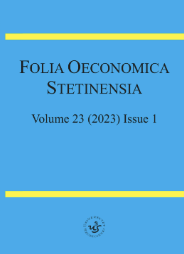Testing the Validity of Okun’s Law in Algeria: Is there a difference between Maki’s Cointegration and Quantile’s Regression Results?
Testing the Validity of Okun’s Law in Algeria: Is there a difference between Maki’s Cointegration and Quantile’s Regression Results?
Author(s): Moussa Chenini, Hicham Ayad, Manel Attouchi, Mohamed Driouche DahmaniSubject(s): Economy, National Economy, Public Finances, Socio-Economic Research
Published by: Wydawnictwo Naukowe Uniwersytetu Szczecińskiego
Summary/Abstract: Research background: This paper examines the existence of Okun’s law in Algeria over the period of 1970–2020 using both the gap and differences model. Purpose: The main objective of this paper is to econometrically examine, explore and test the nexus among unemployment rate and economic growth, in order to have a clear explanation about unemployment in Algeria. Research methodology: Firstly, the Kapetanios unit root test and Maki cointegration test are employed for the gap model to deal with the structural breaks than the estimation of the coefficients in this case, secondly, the quantile regression is used for the differences model; finally, three categories of causality tests are used in this research. Results: The findings revealed that unemployment rates are not affected by output over the period of study both in the gap and differences model. Hence, Okun’s law is not held in Algeria. Novelty: The study focused on Okun’s law in different ways. This latter carries out structural breaks in both the unit root and co-integration analysis. On the other hand, the study uses the quantile regression for the first time in the examination of Okun’s law. In the same line of thought, this research introduces an asymmetric analysis in the Maki cointegration and quantile regression.
Journal: Folia Oeconomica Stetinensia
- Issue Year: 23/2023
- Issue No: 1
- Page Range: 42-63
- Page Count: 22
- Language: English

